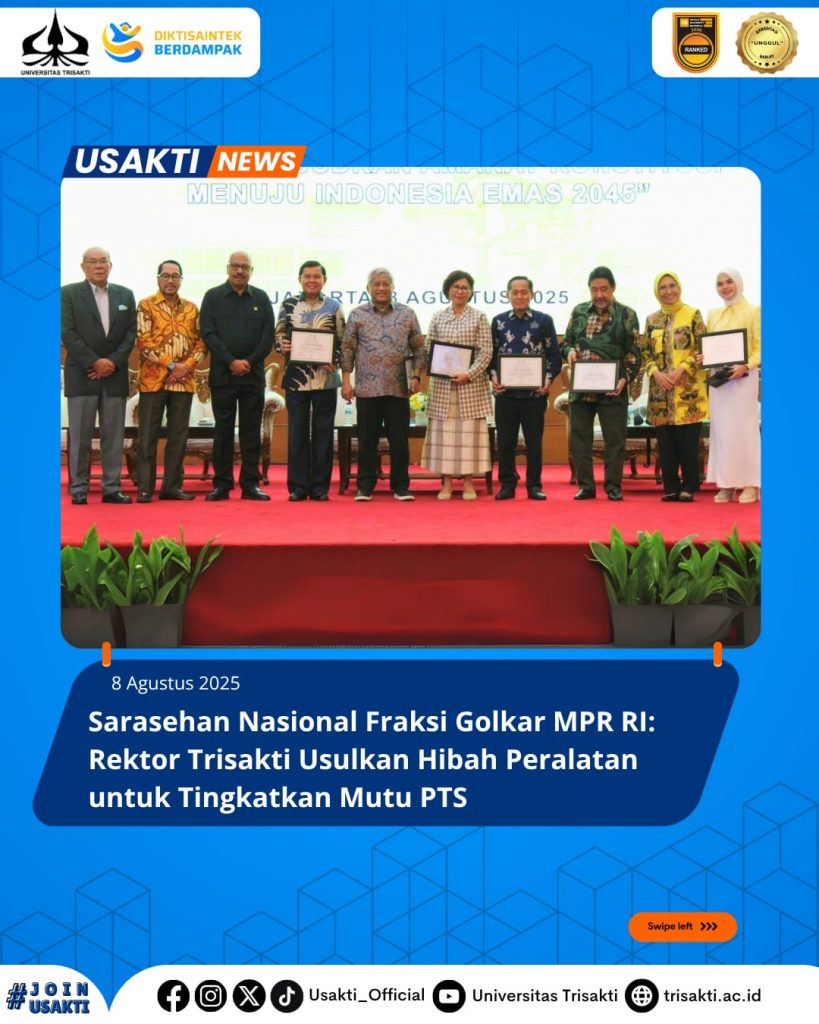Contact Us
- JL. Kyai Tapa No. 1 Grogol
- Jakarta Barat, Indonesia
- Phone:
- (62-21) 566 3232
- Whatsapp:
- (+62) 882 194 856 74
- (+62) 877 707 077 03
- Fax: (62-21) 564 4270
- Email: humas@trisakti.ac.id

Jakarta, August 8, 2025 – The Golongan Karya (Golkar) Party Caucus of the People’s Consultative Assembly of the Republic of Indonesia (MPR RI) held a National Discussion Forum with the theme “Redefining the Education Budget to Realize the Constitutional Mandate Towards a Golden Indonesia 2045.”
The event, held at the Nusantara IV Building of the MPR RI in Jakarta, was attended by the leadership of the Golkar Party Caucus, MPR members, education experts, and representatives from various relevant institutions. It aimed to discuss strategies and policies for managing and optimizing the education budget in line with the constitutional mandate and the vision of a Golden Indonesia 2045.
Event Chairperson Aditya Anugrah Moha, M.Ked., delivered the opening remarks, welcoming participants and speakers. The Chair of the Golkar Party Caucus at the MPR RI, Melchias Markus Mekong, M.H., also addressed the audience, emphasizing the importance of equitable and effective education funding across all regions of Indonesia. He stressed the need for synergy among the central government, local governments, and all stakeholders to improve the quality of national education. The ceremony commenced with the striking of a gong, symbolizing the official start of the event.
The first presentations were delivered by Drs. H. Kahar Muzakir, Deputy Speaker of the MPR RI; Dr. Ir. Hetifah, MPP, Chair of Commission X of the DPR RI; and H. Muhamad Nur Purnamasidi, M.Si., Deputy Secretary of the Golkar Party Caucus at the MPR RI, who shared their perspectives on the theme. This was followed by the keynote addresses from five main speakers:
In his presentation, Prof. Kadarsah highlighted that many higher education institutions in Indonesia, particularly smaller private universities, still face significant challenges in terms of accreditation and resources. He proposed that unused but still functional laboratory equipment from state universities or government institutions be granted to under-resourced universities. Such equipment grants, he argued, could play a crucial role in improving the quality of education in Indonesia.
This National Discussion Forum is expected to serve as a strategic momentum for generating policy recommendations that can strengthen the education sector, ensuring that future generations become high-quality human resources ready to compete on the global stage.